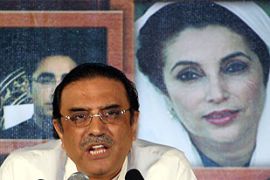Pakistan faces amnesty deal turmoil
Uncertainty looms as agreement exempting officials from graft charges hangs in balance.

Fears mounted on Wednesday over whether the deal would collapse, a development that could force Zardari from office and throw the country into political turmoil.
Media blamed
Many dismiss fears of a crisis, saying the situation has been fuelled by sensationalist politicians, army members unhappy with civilian rule and the media.
“If you look at the Pakistani media these days, if you tune into the big networks, the big word is NRO,” Kamal Hyder, Al Jazeera’s correspondent in Islamabad, said.
|
“Pakistan can hardly afford another political crisis at a time when the challenge from Taliban extremists has really increased” Ishtiaq Ahmad, |
“The demand is that if high officials can be exonerated, then it is paving the way for injustice, and other criminals should be allowed to go scot free from the jails.
“There is a moral debate going on that if these people have such serious charges, then they should have the character and the moral strength to resign, clear their names and then possibly come back into office.”
A recent Gallup survey claimed that more than half of Pakistanis – 57 per cent of those polled – blame the media for stirring up political instability.
The uproar comes as Pakistan’s army battled Taliban fighters in its tribal regions and the potential crisis is a cause for concern in the US, which wants Pakistan to remain focused on its anti-Taliban campaign.
“Pakistan can hardly afford another political crisis at a time when the challenge from Taliban extremists has really increased in recent weeks,” Ishtiaq Ahmad, a professor of international relations at Quaid-i-Azam University in Islamabad, was quoted by the Associated Press as saying.
“What you need is relative political stability and an economy that is really marching ahead.”
‘Politically motivated’
Musharaff’s amnesty list was part of a US-backed deal to allow Zardari’s late wife, Benazir Bhutto, a former Pakistani prime minister, to return from exile in 2007 and run for office safe in the knowledge she would not be dogged by corruption allegations.
The US and other Western powers supported the bid by Bhutto, who was seen as a secular and pro-Western politician.
But Bhutto, who was forced from her post twice in the 1990s because of alleged corruption, was killed by a suicide bomber shortly after she returned to Pakistan.
Zardari took over as co-chairman of her party and was elected president in September 2008 by federal and regional lawmakers.
Over the weekend, the government released the list of some of those who had been protected by the decree, including the interior and defence ministers.
Many on the list have expressed a willingness to fight the charges in court.
“The PPP co-chairman, our ministers and our members have no issues with going forward with these cases,” said Farahnaz Ispahani, a presidential spokeswoman.
“Ninety per cent of them were politically motivated cases.”